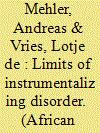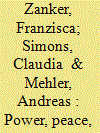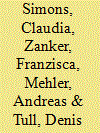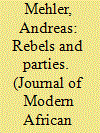|
|
|
Sort Order |
|
|
|
Items / Page
|
|
|
|
|
|
|
| Srl | Item |
| 1 |
ID:
075102


|
|
|
|
|
| Publication |
Leiden, Brill, 2005.
|
| Description |
xvi, 495p.pbk
|
| Standard Number |
9004144625
|
|
|
|
|
|
|
|
|
|
|
|
Copies: C:1/I:0,R:0,Q:0
Circulation
| Accession# | Call# | Current Location | Status | Policy | Location |
| 051935 | 960.305/MEH 051935 | Main | On Shelf | General | |
|
|
|
|
| 2 |
ID:
064901


|
|
|
| 3 |
ID:
165975


|
|
|
|
|
| Summary/Abstract |
Assumptions about the political economy of African states predominantly centre on a dominant elite’s ability to stabilize power. A key assertion is that elites maintain clientelistic networks of rents and redistribution and in turn extend their control over their respective territories by instrumentalizing disorder. We challenge the assumption that disorder plays such a functional role. Largely drawing on data and fieldwork from the Central African Republic, we demonstrate the profoundly unproductive consequences of disorder that tend to be overlooked through current approaches to the political economy of African countries. We investigate how disorder impacts three dimensions of effective politics of domination: a set of elite groups that structure power in society, a political economy that redistributes its benefits through formal and informal networks, and the existence of functional centre–periphery ties across a territory. The article shows with regard to the Central African Republic that disorder has produced a small political elite that is largely unable to stabilize its power basis. We argue that certain African states are subject to forms of disorder that political elites cannot turn into an advantage.
|
|
|
|
|
|
|
|
|
|
|
|
|
|
|
|
| 4 |
ID:
098510


|
|
|
|
|
| Publication |
2010.
|
| Summary/Abstract |
Peace accords usually involve top politicians and military leaders, who negotiate, sign, and/or benefit from an agreement. What is conspicuously absent from such negotiations is broad-based participation by those who should benefit in the first place: citizens. More specifically, the local level of security provision and insecurity production is rarely taken into account. The analysis of recent African peace agreements shows important variations in power-sharing devices and why it is important to ask who is sharing power with whom. Experiences with power sharing are mixed and far less positive than assumed by outside negotiators.
|
|
|
|
|
|
|
|
|
|
|
|
|
|
|
|
| 5 |
ID:
137756


|
|
|
|
|
| Summary/Abstract |
Power-sharing agreements have become a blueprint for efforts to end violent conflicts in many parts of the world, particularly in Africa. Such agreements, however, rarely include territorial power sharing – at least, not according to the formal, rather unhelpful narrow definition that includes federalism and decentralization. This article argues that the concept of territorial power sharing needs to be broadened in order to account for the manifold informal or indirect manifestations of such arrangements. Drawing on extensive fieldwork data from the DRC, Liberia, and Kenya, the article analyses the history of spatiality and power in Africa in order to explain why formal mechanisms of territorial power sharing are rare and why more subtle types of informal territorial power sharing are much more common. Based on this analysis, we conclude that territorial power sharing is present in many African states, but that typically it is overlooked because of its informal nature.
|
|
|
|
|
|
|
|
|
|
|
|
|
|
|
|
| 6 |
ID:
124262


|
|
|
|
|
| Publication |
2013.
|
| Summary/Abstract |
Research on power-sharing in Africa remains silent on the effects of national peace agreements on the sub-national level. Conversely, most armed conflicts originate and are fought in (or over) specific areas. A plausible hypothesis would be that for power-sharing to have the desired pacifying effect throughout the national territory, it needs to be extended to the local level. Based on fieldwork in six former hotspots in Liberia, Burundi and the Democratic Republic of Congo (DRC) we find that there is hardly any local content, including local power-sharing, in national agreements. However, contrary to our hypothesis, neither local content (inclusion of actors or interest) nor local-power-sharing (either introducing a local power balance or monopoly) are indispensable to effectively bring about local peace, at least in the short-term. On the contrary, it might even endanger the peace process. The importance of the sub-national level is overestimated in some cases and romanticised in others. However, the history of spatial-political links, centralised policies, and the establishment of local balances or monopolies of power ultimately play an important role.
|
|
|
|
|
|
|
|
|
|
|
|
|
|
|
|
| 7 |
ID:
102401


|
|
|
|
|
| Publication |
2011.
|
| Summary/Abstract |
This paper analyses the declining importance of political parties in the Central African Republic (CAR). The country can be considered an extreme example of the lack of viability of a state in general, and democracy in particular. However, the quality of elections has exceeded the average in the sub-region over a substantial time-span. Hopes for a democratic future only faded in recent years. The paper hypothesises that both political parties and rebel movements are failing to adequately represent (ethnoregional) interests, but that parties are suffering more in the course of the enduring war and the peace process. Patterns of elite behaviour are presented as the main explanation for the resulting crisis of representation, with international actors' preference for inclusionary power-sharing deals seen as the main aggravating factor.
|
|
|
|
|
|
|
|
|
|
|
|
|
|
|
|
| 8 |
ID:
109945


|
|
|
|
|
| Publication |
2012.
|
| Summary/Abstract |
Little attention has been paid to the factual contribution of the state's security forces to the physical security of African citizens. Reports about security forces adding to a widespread insecurity are frequent: the protectors become violators, and their appearance causes fear, not security. In many African crisis countries the realization of better security forces appears to be an elusive goal, either because violent conflicts are not definitively settled and therefore do not allow for decent reform or because a lack of capacity as a result of material constraints is not easy to remedy. Above all, the political will of governments to reform their security forces, including their composition and structure, is often limited. This contribution compares the security provision by official forces in Liberia and the Central African Republic, two extreme cases of strong and weak international involvement, respectively, in postconflict security-sector reform. Blueprint models for such reforms that do not take into account local expectations and experiences are bound to fail.
|
|
|
|
|
|
|
|
|
|
|
|
|
|
|
|
|
|
|
|
|